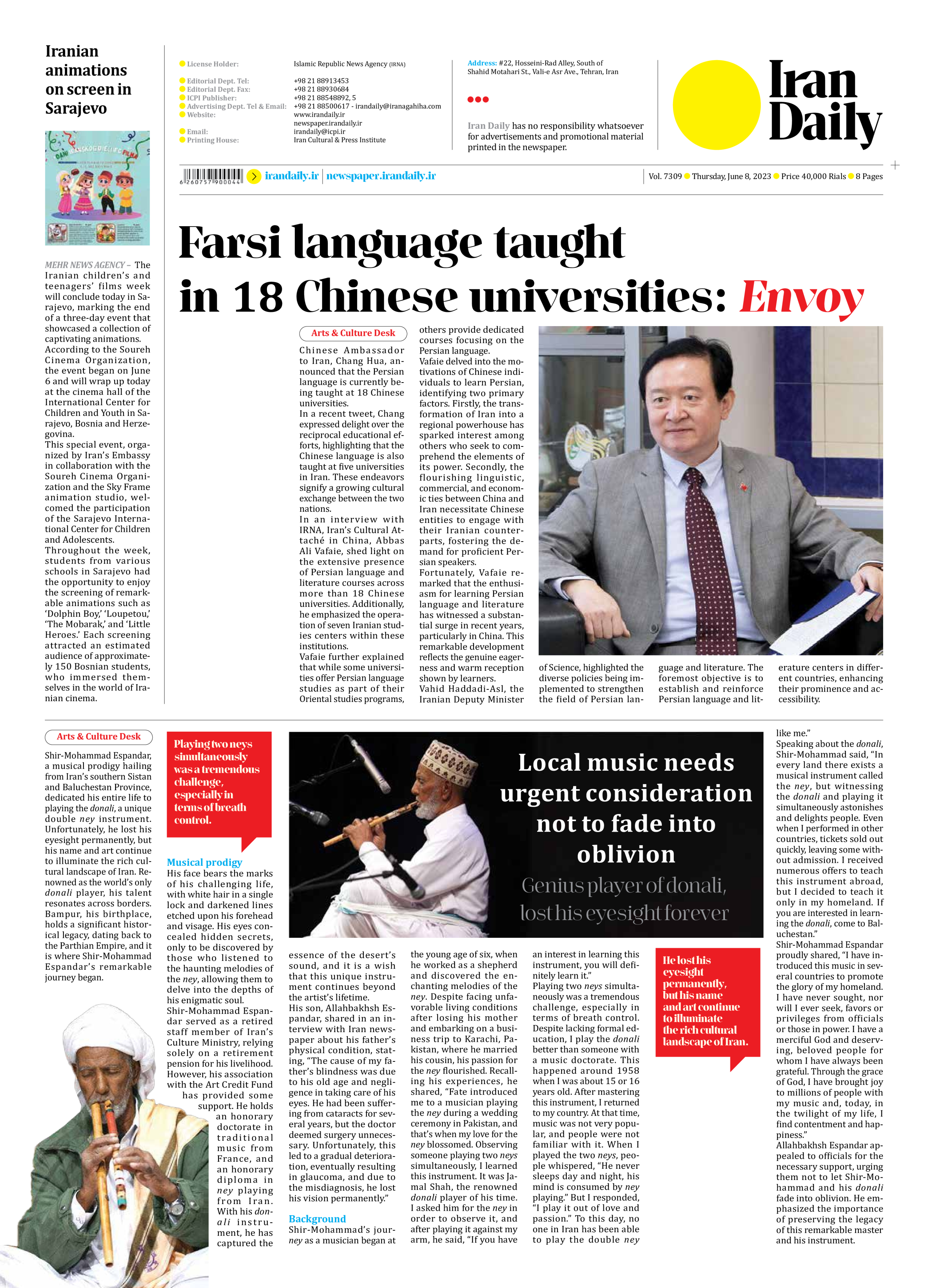
Local music needs urgent consideration not to fade into oblivion
Genius player of donali, lost his eyesight forever
Shir-Mohammad Espandar, a musical prodigy hailing from Iran’s southern Sistan and Baluchestan Province, dedicated his entire life to playing the donali, a unique double ney instrument. Unfortunately, he lost his eyesight permanently, but his name and art continue to illuminate the rich cultural landscape of Iran. Renowned as the world’s only donali player, his talent resonates across borders. Bampur, his birthplace, holds a significant historical legacy, dating back to the Parthian Empire, and it is where Shir-Mohammad Espandar’s remarkable journey began.
Musical prodigy
His face bears the marks of his challenging life, with white hair in a single lock and darkened lines etched upon his forehead and visage. His eyes concealed hidden secrets, only to be discovered by those who listened to the haunting melodies of the ney, allowing them to delve into the depths of his enigmatic soul.
Shir-Mohammad Espandar served as a retired staff member of Iran’s Culture Ministry, relying solely on a retirement pension for his livelihood. However, his association with the Art Credit Fund has provided some support. He holds an honorary doctorate in traditional music from France, and an honorary diploma in ney playing from Iran. With his donali instrument, he has captured the essence of the desert’s sound, and it is a wish that this unique instrument continues beyond the artist’s lifetime.
His son, Allahbakhsh Espandar, shared in an interview with Iran newspaper about his father’s physical condition, stating, “The cause of my father’s blindness was due to his old age and negligence in taking care of his eyes. He had been suffering from cataracts for several years, but the doctor deemed surgery unnecessary. Unfortunately, this led to a gradual deterioration, eventually resulting in glaucoma, and due to the misdiagnosis, he lost his vision permanently.”
Background
Shir-Mohammad’s journey as a musician began at the young age of six, when he worked as a shepherd and discovered the enchanting melodies of the ney. Despite facing unfavorable living conditions after losing his mother and embarking on a business trip to Karachi, Pakistan, where he married his cousin, his passion for the ney flourished. Recalling his experiences, he shared, “Fate introduced me to a musician playing the ney during a wedding ceremony in Pakistan, and that’s when my love for the ney blossomed. Observing someone playing two neys simultaneously, I learned this instrument. It was Jamal Shah, the renowned donali player of his time. I asked him for the ney in order to observe it, and after playing it against my arm, he said, “If you have an interest in learning this instrument, you will definitely learn it.”
Playing two neys simultaneously was a tremendous challenge, especially in terms of breath control. Despite lacking formal education, I play the donali better than someone with a music doctorate. This happened around 1958 when I was about 15 or 16 years old. After mastering this instrument, I returned to my country. At that time, music was not very popular, and people were not familiar with it. When I played the two neys, people whispered, “He never sleeps day and night, his mind is consumed by ney playing.” But I responded, “I play it out of love and passion.” To this day, no one in Iran has been able to play the double ney
like me.”
Speaking about the donali, Shir-Mohammad said, “In every land there exists a musical instrument called the ney, but witnessing the donali and playing it simultaneously astonishes and delights people. Even when I performed in other countries, tickets sold out quickly, leaving some without admission. I received numerous offers to teach this instrument abroad, but I decided to teach it only in my homeland. If you are interested in learning the donali, come to Baluchestan.”
Shir-Mohammad Espandar proudly shared, “I have introduced this music in several countries to promote the glory of my homeland. I have never sought, nor will I ever seek, favors or privileges from officials or those in power. I have a merciful God and deserving, beloved people for whom I have always been grateful. Through the grace of God, I have brought joy to millions of people with my music and, today, in the twilight of my life, I find contentment and happiness.”
Allahbakhsh Espandar appealed to officials for the necessary support, urging them not to let Shir-Mohammad and his donali fade into oblivion. He emphasized the importance of preserving the legacy of this remarkable master and his instrument.







